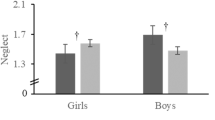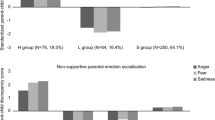Abstract
Parents and adolescents often hold discrepant perceptions of parental emotion socialization, which reflect misunderstandings in parent-adolescent communication on emotions and have potential detrimental effects on mental health of adolescents. The present study investigated the associations between parent-adolescent congruence and discrepancy in parental emotion socialization perception to two specific negative emotions (anger and sadness) and depressive symptoms in Chinese adolescents. A total of 372 adolescents (48.4% female, Mage = 13.43, SDage = 0.49) and their parents (79.6% mother, Mage = 41.15, SDage = 5.46) participated in this study. Both parents and adolescents reported perceived parental emotion socialization to anger and sadness, and adolescents reported depressive symptoms. Data were analyzed using polynomial regression and response surface analyses. Both congruence and discrepancy in parent and adolescent’s reports were associated with adolescent depressive symptoms. A higher level of adolescent depressive symptoms was associated with higher parent-adolescent congruence in supportive responses to anger, sadness, and nonsupportive responses to anger. A higher level of depressive symptoms was associated with inconsistent reporting of supportive responses to sadness and nonsupportive responses to anger (only when parents had a more positive view than adolescents). This study highlights the significance of evaluating parent-child communication process by assessing perceived emotion socialization from both parents and adolescents and analyzing the reporting congruence and discrepancy. It also suggests that enhancing effective communication regarding parental emotion socialization could be a promising target for adolescent mental health promotion programs.

Similar content being viewed by others
References
American Psychiatric Association. (2013). Diagnostic and statistical manual of mental disorders: DSM-5 (pp. xliv, 947). American Psychiatric Publishing, Inc. https://doi.org/10.1176/appi.books.9780890425596
Barranti, M., Carlson, E. N., & Côté, S. (2017). How to test questions about similarity in personality and social psychology research: description and empirical demonstration of response surface analysis. Social Psychological and Personality Science, 8(4), 465–475. https://doi.org/10.1177/1948550617698204.
Benbassat, N., & Priel, B. (2012). Parenting and adolescent adjustment: The role of parental reflective function. Journal of Adolescence, 35(1), 163–174. https://doi.org/10.1016/j.adolescence.2011.03.004.
Birleson, P. (1981). The validity of depressive disorder in childhood and the development of a self-rating scale: a research report. Journal of Child Psychology and Psychiatry and Allied Disciplines, 22(1), 73.
Blakemore, S.-J., & Mills, K. L. (2014). Is adolescence a sensitive period for sociocultural processing? Annual Review of Psychology, 65(1), 187–207. https://doi.org/10.1146/annurev-psych-010213-115202.
Chronis-Tuscano, A., Bui, H. N. T., & Lorenzo, N. E. (2021). Transdiagnostic implications of parental socialization of child and adolescent emotional development: commentary and future directions. Research on Child and Adolescent Psychopathology, 50(2), 269–282. https://doi.org/10.1007/s10802-021-00872-3.
Cui, L., Tang, G., & Huang, M. (2022). Expressive suppression, confucian Zhong Yong thinking, and psychosocial adjustment among Chinese young adults. Asian Journal of Social Psychology, 25(4), 715–730. https://doi.org/10.1111/ajsp.12529.
D’Avanzato, C., Joormann, J., Siemer, M., & Gotlib, I. H. (2013). Emotion regulation in depression and anxiety: examining diagnostic specificity and stability of strategy use. Cognitive Therapy and Research, 37(5), 968–980. https://doi.org/10.1007/s10608-013-9537-0.
De Los Reyes, A. (2011). Introduction to the special section: More than measurement error: Discovering meaning behind informant discrepancies in clinical assessments of children and adolescents. Journal of Clinical Child and Adolescent Psychology: The Official Journal for the Society of Clinical Child and Adolescent Psychology, American Psychological Association, Division 53, 40(1), 1–9. https://doi.org/10.1080/15374416.2011.533405.
De Los Reyes, A., Alfano, C. A., Lau, S., Augenstein, T. M., & Borelli, J. L. (2016). Can we use convergence between caregiver reports of adolescent mental health to index severity of adolescent mental health concerns? Journal of Child and Family Studies, 25(1), 109–123. https://doi.org/10.1007/s10826-015-0216-5.
De Los Reyes, A., Goodman, K. L., Kliewer, W., & Reid-Quiñones, K. (2008). Whose depression relates to discrepancies? Testing relations between informant characteristics and informant discrepancies from both informants’ perspectives. Psychological Assessment, 20(2), 139–149. https://doi.org/10.1037/1040-3590.20.2.139.
De Los Reyes, A., Ohannessian, C. M., & Racz, S. J. (2019). Discrepancies between adolescent and parent reports about family relationships. Child Development Perspectives, 13(1), 53–58. https://doi.org/10.1111/cdep.12306.
Dimler, L. M., Natsuaki, M. N., Hastings, P. D., Zahn-Waxler, C., & Klimes-Dougan, B. (2017). Parenting effects are in the eye of the beholder: parent-adolescent differences in perceptions affects adolescent problem behaviors. Journal of Youth and Adolescence, 46(5), 1076–1088. https://doi.org/10.1007/s10964-016-0612-1.
Edwards, J. (2002). Alternatives to difference scores: Polynomial regression analysis and response surface methodology. Advances in Measurement and Data Analysis.
Eid, M., & Diener, E. (2001). Norms for experiencing emotions in different cultures: Inter- and intranational differences. Journal of Personality and Social Psychology, 81(5), 869–885. https://doi.org/10.1037//0022-3514.81.5.869.
Eisenberg, N., Cumberland, A., & Spinrad, T. L. (1998). Parental socialization of emotion. Psychological Inquiry, 9(4), 241–273. https://doi.org/10.1207/s15327965pli0904_1.
Fan, J., Ni, X., Wang, Y., Qian, Y., Li, X., & Geng, Y. (2023). Parent–child discrepancies in perceived parental emotion socialization: associations with children’s internalizing and externalizing problems in Chinese families. Journal of Youth and Adolescence, 52(3), 547–560. https://doi.org/10.1007/s10964-022-01711-4.
Felton, J. W., Shadur, J. M., Havewala, M., Cassidy, J., Lejuez, C. W., & Chronis-Tuscano, A. (2022). Specific pathways from parental distress reactions to adolescent depressive symptoms: the mediating role of youths’ reactions to negative life events. Journal of Psychopathology and Behavioral Assessment, 44(3), 750–762. https://doi.org/10.1007/s10862-022-09954-y.
Garber, J., Robinson, N. S., & Valentiner, D. (1997). The relation between parenting and adolescent depression: self-worth as a mediator. Journal of Adolescent Research, 12(1), 12–33. https://doi.org/10.1177/0743554897121003.
Goodman, K. L., De Los Reyes, A. & Bradshaw, C. P. (2010). Understanding and Using Informants' Reporting Discrepancies ofYouth Victimization: A Conceptual Model and Recommendations for Research. Clinical Child and Family Psychology Review, 13(4), 366–383. https://doi.org/10.1007/s10567-010-0076-x.
Harmon, S. L., Stephens, H. F., Repper, K. K., Driscoll, K. A., & Kistner, J. A. (2019). Children’s rumination to sadness and anger: implications for the development of depression and aggression. Journal of Clinical Child & Adolescent Psychology, 48(4), 622–632. https://doi.org/10.1080/15374416.2017.1359788.
Havighurst, S. S., Kehoe, C. E., & Harley, A. E. (2015). Tuning in to teens: Improving parental responses to anger and reducing youth externalizing behavior problems. Journal of Adolescence (London, England.), 42(Journal Article), 148–158. https://doi.org/10.1016/j.adolescence.2015.04.005.
Hou, Y., Benner, A. D., Kim, S. Y., Chen, S., Spitz, S., Shi, Y., & Beretvas, T. (2020). Discordance in parents’ and adolescents’ reports of parenting: A meta-analysis and qualitative review. The American Psychologist, 75(3), 329–348. https://doi.org/10.1037/amp0000463.
Hu, J., Zhou, T., & Huang, Z. (2023). Parental Emotion Socialization, Emotion Regulation and Depressive Symptoms in Chinese Adolescence: The Role of Family Cohesion. The Journal of Early Adolescence, 02724316231176955. https://doi.org/10.1177/02724316231176955
Huang, C. (2015). Relation between attributional style and subsequent depressive symptoms: a systematic review and meta-analysis of longitudinal studies. Cognitive Therapy and Research, 39(6), 721–735. https://doi.org/10.1007/s10608-015-9700-x.
Human, L. J., Dirks, M. A., DeLongis, A., & Chen, E. (2016). Congruence and Incongruence in Adolescents’ and Parents’ Perceptions of the Family: Using Response Surface Analysis to Examine Links with Adolescents’ Psychological Adjustment. Journal of Youth and Adolescence, 45(10), 2022–2035. https://doi.org/10.1007/s10964-016-0517-z.
Janssen, L. H. C., Verkuil, B., van Houtum, L. A. E. M., Wever, M. C. M., & Elzinga, B. M. (2021). Perceptions of parenting in daily life: adolescent-parent differences and associations with adolescent affect. Journal of Youth and Adolescence, 50(12), 2427–2443. https://doi.org/10.1007/s10964-021-01489-x.
Laird, R. D., & De Los Reyes, A. (2013). Testing informant discrepancies as predictors of early adolescent psychopathology: why difference scores cannot tell you what you want to know and how polynomial regression may. Journal of Abnormal Child Psychology, 41(1), 1–14. https://doi.org/10.1007/s10802-012-9659-y.
Lugo-Candelas, C. I., Harvey, E. A., & Breaux, R. P. (2015). Emotion socialization practices in Latina and European-American mothers of preschoolers with behavior problems. Journal of Family Studies, 21(2), 144–162. https://doi.org/10.1080/13229400.2015.1020982.
Luo, J., Wang, M.-C., Gao, Y., Deng, J. & Qi, S.-S. (2020). Factor structure and construct validity of the Emotions as a ChildScale (EAC) in Chinese children. Psychological Assessment, 32(1), 85–97. https://doi.org/10.1037/pas0000762.
Nelemans, S. A., Branje, S. J. T., Hale, W. W., Goossens, L., Koot, H. M., Oldehinkel, A. J., & Meeus, W. H. J. (2016). Discrepancies between perceptions of the parent–adolescent relationship and early adolescent depressive symptoms: an illustration of polynomial regression analysis. Journal of Youth and Adolescence, 45(10), 2049–2063. https://doi.org/10.1007/s10964-016-0503-5.
O’Neal, C. R., & Magal, C. (2005). Do parents respond in different ways when children feel different emotions? The emotional context of parenting. Development and Psychopathology, 17(2), 467–487. https://doi.org/10.1017/S0954579405050224.
Price, N. N., Scelsa, V. L., Zeman, J. L., & Luebbe, A. M. (2023). Profiles of adolescents’ sadness, anger, and worry regulation: Characterization and relations with psychopathology. Emotion, 23(2), 473–485. https://doi.org/10.1037/emo0001084.supp.
Rapp, A. M., Tan, P. Z., Grammer, J. K., Gehring, W. J., Miller, G. A., & Chavira, D. A. (2021). Cultural Values Influence Relations Between Parent Emotion Socialization and Adolescents’ Neural Responses to Peer Rejection. Research on Child and Adolescent Psychopathology. https://doi.org/10.1007/s10802-020-00764-y
Schhnbrodt, F. D. (2015). Testing Fit Patterns with Polynomial Regression Models. SSRN Electronic Journal. https://doi.org/10.2139/ssrn.2753669
Su, L., Wang, K., Zhu, Y., Luo, X., & Yang, Z. (2003). Norm of the depression self-rating scale for children in Chinese urban. Children. Chinese Mental Health Journal, 17(8), 547–549. https://doi.org/10.3321/j.issn:1000-6729.2003.08.011.
Shanock, L. R., Baran, B. E., Gentry, W. A., Pattison, S. C., & Heggestad, E. D. (2010). Polynomial regression with response surface analysis: a powerful approach for examining moderation and overcoming limitations of difference scores. Journal of Business and Psychology, 25(4), 543–554. https://doi.org/10.1007/s10869-010-9183-4.
Timmers, M., Fischer, A. H., & Manstead, A. S. R. (1998). Gender differences in motives for regulating emotions. Personality & Social Psychology Bulletin, 24(9), 974–985. https://doi.org/10.1177/0146167298249005.
Trang, D. T., & Yates, T. M. (2020). (In)Congruent parent–child reports of parental behaviors and later child outcomes. Journal of Child and Family Studies, 29(7), 1845–1860. https://doi.org/10.1007/s10826-020-01733-1.
Wang, M., Liang, Y., Zhou, N., & Zou, H. (2019). Chinese fathers’ emotion socialization profiles and adolescents’ emotion regulation. Personality and Individual Differences, 137, 33–38. https://doi.org/10.1016/j.paid.2018.08.006.
Acknowledgements
We are grateful to the adolescents and parents who participated in this study. We are grateful to the teachers and school who assisted in the data collection.
Funding
The present study was supported by Beijing Education Sciences Planning Project (Grant Number: BECA22128).
Data Sharing and DeclarationThe datasets generated and/or analyzed during the current study are not publicly available but are available from the corresponding author on reasonable request.
Author information
Authors and Affiliations
Contributions
J.H. contributed to research design, statistical analyses, interpretation of the data, and draft writing; T.Z. conceptualized the study, participated in research design and data collection, and revised the manuscript. Both authors read and approved the final version of this manuscript.
Corresponding author
Ethics declarations
Conflict of interest
The authors declare that no competing interests.
Ethical approval
Approval was granted by the research ethics committee of Peking University Health Science Center. This study was performed in line with the principles of the Declaration of Helsinki.
Informed Consent
All participants provided informed consent prior to participation in the study.
Additional information
Publisher’s note Springer Nature remains neutral with regard to jurisdictional claims in published maps and institutional affiliations.
Rights and permissions
Springer Nature or its licensor (e.g. a society or other partner) holds exclusive rights to this article under a publishing agreement with the author(s) or other rightsholder(s); author self-archiving of the accepted manuscript version of this article is solely governed by the terms of such publishing agreement and applicable law.
About this article
Cite this article
Hu, J., Zhou, T. Parent-adolescent Congruence and Discrepancy in Perceived Parental Emotion Socialization to Anger and Sadness: Using Response Surface Analysis to Examine the Links with Adolescent Depressive Symptoms. J. Youth Adolescence 53, 67–78 (2024). https://doi.org/10.1007/s10964-023-01919-y
Received:
Accepted:
Published:
Issue Date:
DOI: https://doi.org/10.1007/s10964-023-01919-y




